FlexiSpot G7: two-minute review
The FlexiSpot G7 is another attempt for the company to corner the standing desk market, with a premium monster of a gaming desk. It comes in with a host of features that you'd expect from a mid-range desk and even a couple that I'd associate with a more premium price. The question is, do those features actually justify a $700 price tag for this US-only desk?
The version I was sent was the 55 x 28-inch (139.7 x 71cm) desktop, with a FPS finish. Slightly textured, and with a glitter look, it not only feels great under my hands but it means I don't have to use a mousepad with it. It's also curved inward and chamfered at the edge, which along with the vast adjustability of the stand I was sent, puts this particular model pretty high on the ergonomics scale.
Included in the top-end price, I was sent the most expensive stand and keypad combo which is what really pushes this model into the region of $700. There are some cheaper options, though pairing it with the cheaper stand means foregoing the ridiculous weight capacity and Premier keypad, which I'll get into later. For now, we'll concentrate on this version explicitly, and so far I've been thoroughly impressed.
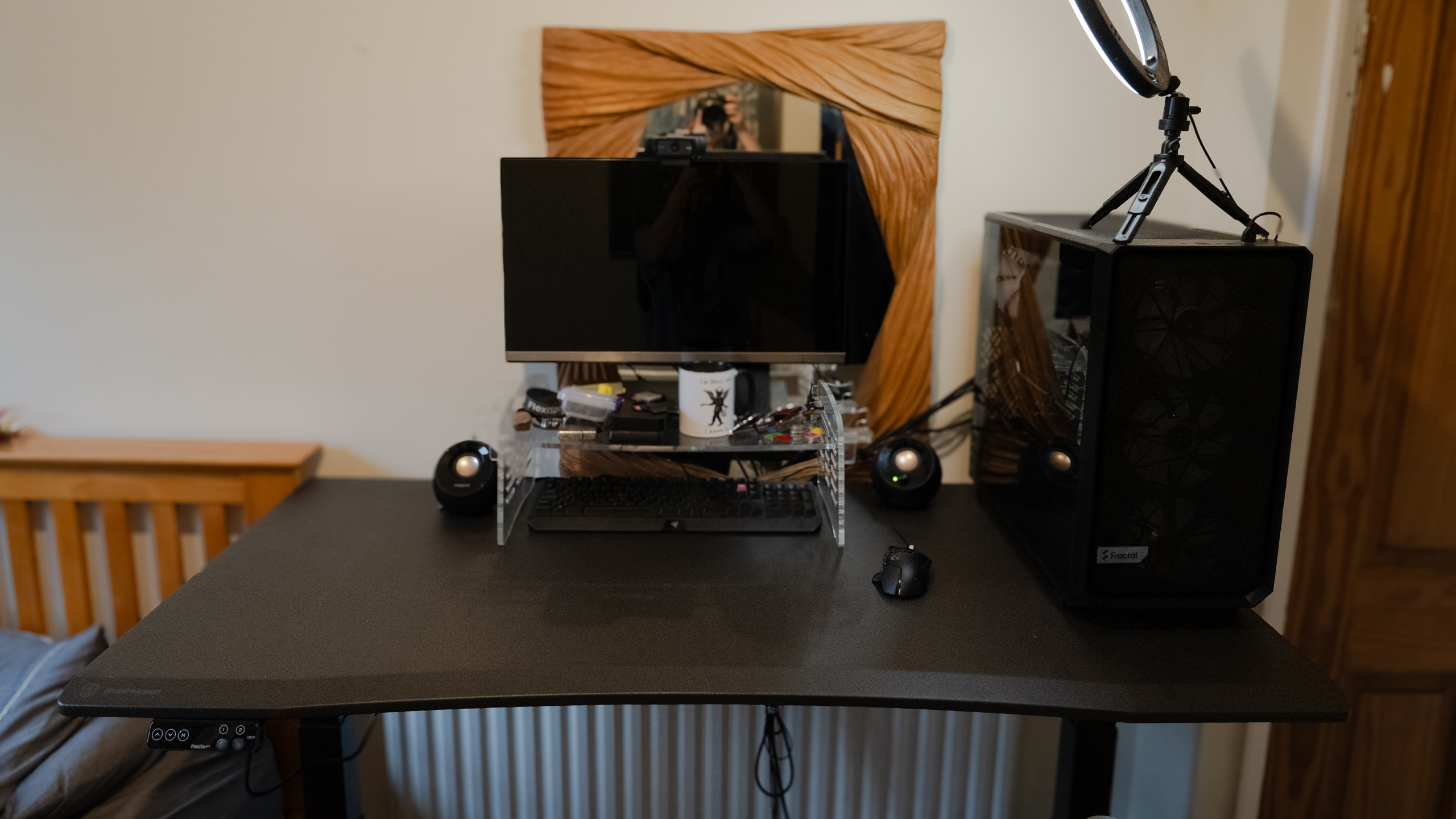
From fantastic ergonomics to adjustable collision detection, and a ridiculous weight capacity that would seat the most monstrous of gaming rigs, there's really a lot to like about the G7. There are a couple of minor drawbacks, such as a slightly noisy motor and a minor wobble when extended to a standing position, the only real issue I have is the added price of the E7 Pro stand.
The biggest competition for the G7 right now is the FlexiSpot E7, an impressive desk from the same company that's currently sitting atop our best standing desk guide and actually makes use of the alternative (and far cheaper) E7 stand. The E7 desk you can get for around the same price as the G7, though there are often discounts to be found on the E7 today.
I wouldn't necessarily pay the difference for the G7 with the top-end and frankly unnecessary E7 Pro stand – unless I had a supremely heavy setup – but I would potentially stretch another $50 dollars for the fantastic ergonomics and gorgeous finish of the G7 desktop. If I had a wireless charging phone, however, the Flexispot E7 with wireless charging is still likely to win out. However, if you wanted to cheat the system, you can just configure the often discounted E7 with the E7 frame and the G7 Gaming Series desktop to get the exact same desk for less.
FlexiSpot G7: Price and availability
- List price of $704.98
- Only available in the US
- Price difference between stands is silly
At time of writing, the FlexiSpot G7 is only available in the US, where the smaller version with the most premium legs will set you back just over $700. That's without any cable management included since the optional cable tray doesn't fit the 55-inch (139 cm) desktop unless you drill it yourself. This version is only really necessary if you've got an overly heavy setup since the major difference – other than the price – is the weight capacity.
This version of the G7 goes up against some of the top standing desks around. Even when paired with the E5-A stand, it's not going to come in as our favorite budget standing desk when the FlexiSpot E5 exists. And while it's not as impressive (nor as expensive) as something like the Beflo Tenon Premium, it sits pretty much right in the middle at that pricing sweet spot for gaming desks. I would have liked to see compatibility with all the FlexiSpot greebles for the price, though.
If your PC setup doesn't weigh in at more than 355 lbs (161 kg), I'd recommend saving a few bucks by pairing the fantastic G7 desktop with the standard E7 frame and Premium keypad instead, as there's just not enough impressive features to warrant the extra cost of the E7 Pro.
FlexiSpot G7: Specs
The FlexiSpot G7 specifications when using the three different compatible stands:
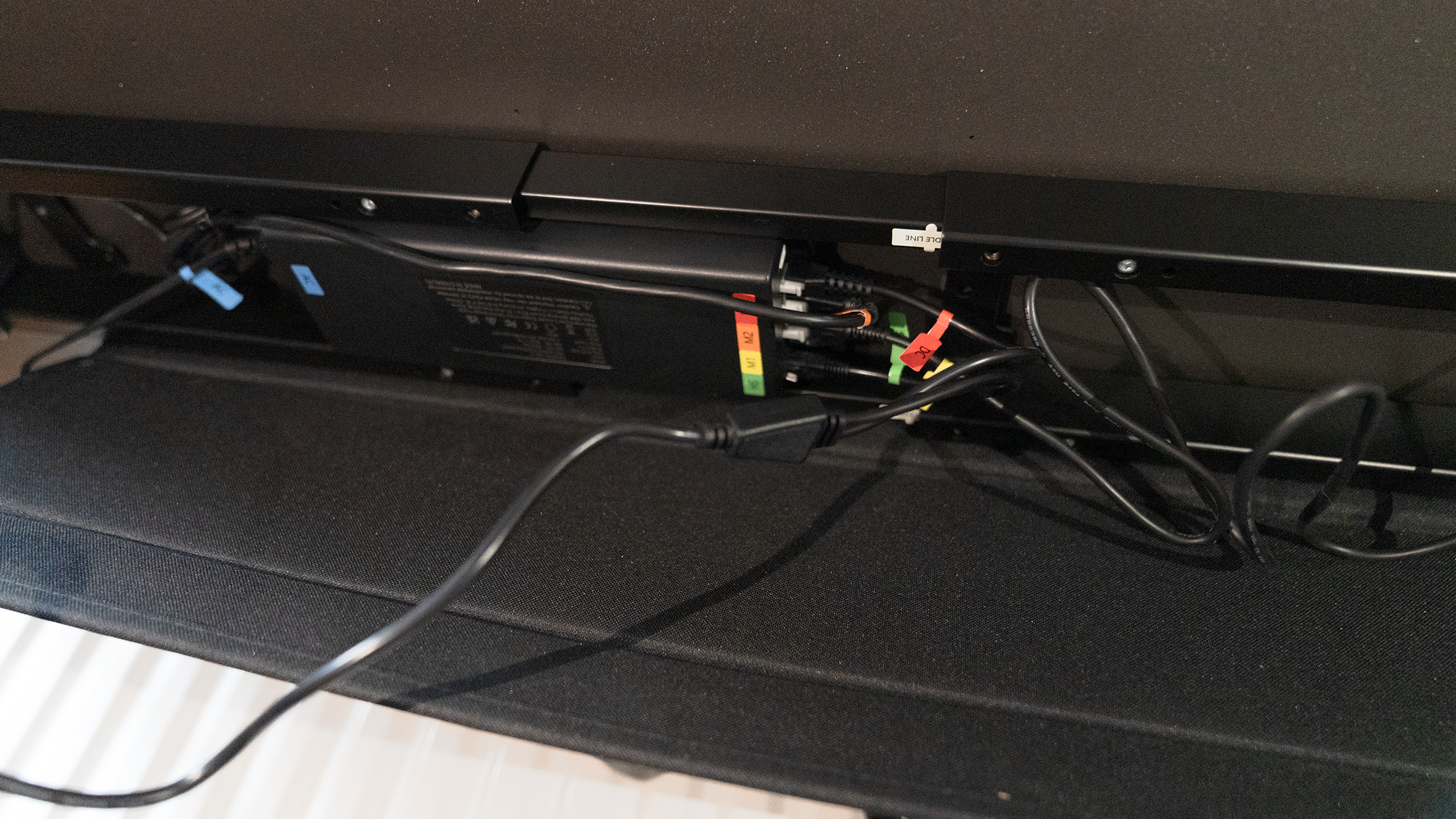
FlexiSpot G7: Assembly
- Super simple 50 min setup
- Easy-to-understand instructions
- Lots of non-recyclable packaging
Out of the box, I was impressed with the weight of the FlexiSpot G7. It came in two separate packages, which makes sense for a fully configurable mix-and-match desk. Thankfully I had two helpers to move it upstairs, and would recommend getting another person to help you move it for the sake of your spine.
I was able to get the desk and legs out of the box and set up in less than 50 minutes with two people unpacking and screwing. Granted I'm well versed in desk assembly and my helper is a Physicist, but it was mostly thanks to FlexiSpot's superbly laid out instructions and simple fixture solutions.
A setup time like that makes it a great option for the time-poor, though that doesn't include the time spent clearing up all the non-recyclable plastic packaging, which we had to put in the trash. The G7 was packed safely, with easy-to-remove packaging, but I do wish companies would start using more sustainable packing materials. Just a thought.
Getting it up once the legs were on was not so bad, since I was able to position it so I could just flip it into place, though I wish the instructions told me to attach the keypad after turning it over as I had to lift one edge so it didn't snap off. It's also worth mentioning that I managed to put it together in a spare bedroom in a UK terraced house, which is a pretty small space. So although the G7 might come across as monstrous it's not so bad as long as you don't have too many breakables in the vicinity.
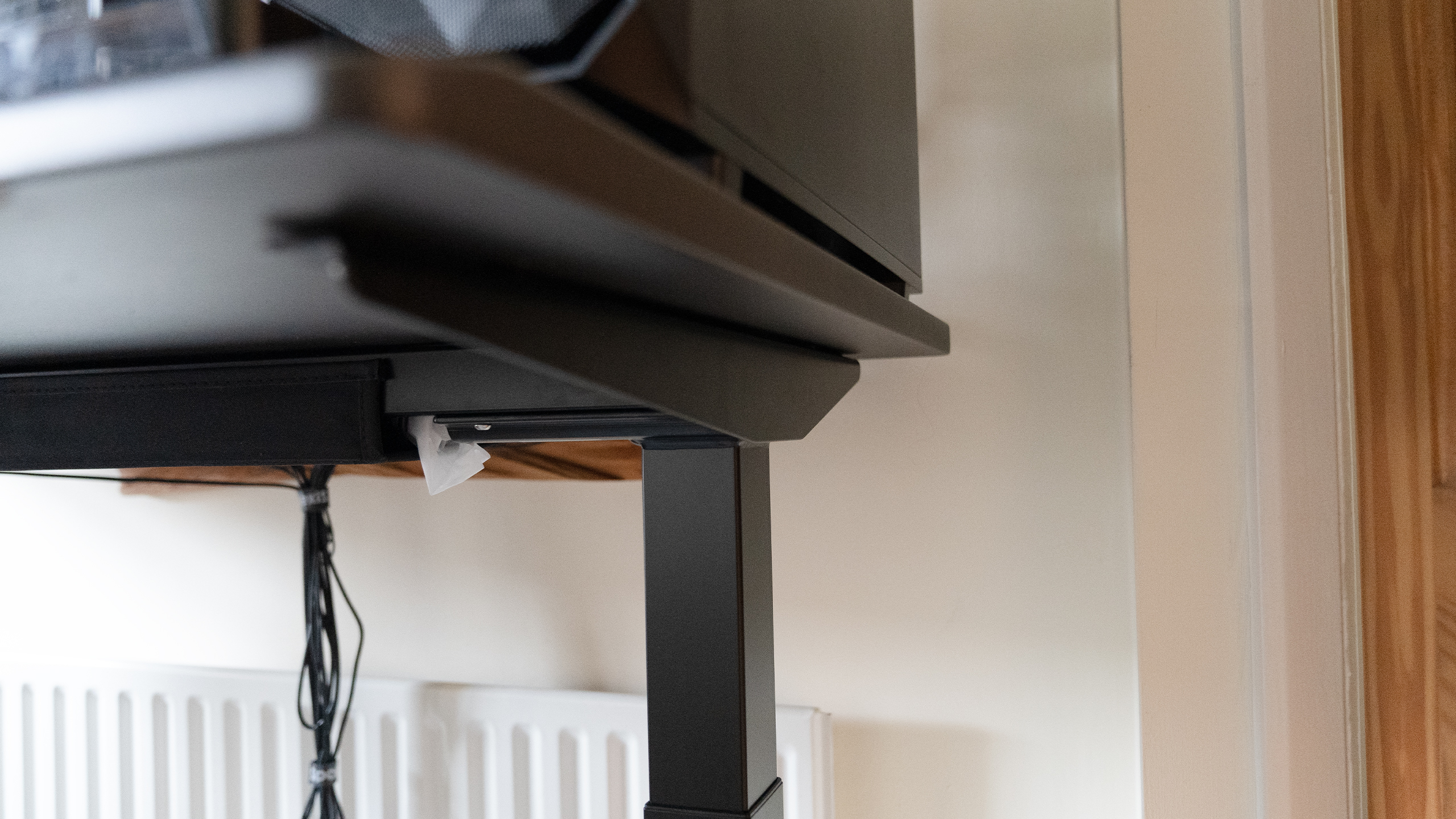
FlexiSpot G7: Design and features
- Curved front with chamfered edge
- Cable cutout at the back
- Gorgeous finish on the tabletop
The surface of the FlexiSpot G7 desktop is a bit strange to the touch, but not bad, just not smooth like your standard desktop. It's textured, which isn't generally something people look for in a desk but bear with me. It's got a good sparkle to the finish and, while that won't be for everyone, there's something really satisfying to me about catching the G7 glittering out the corner of my eye as I move around it. Importantly, the textured finish doesn't seem to worsen my aim when I use it without a mousepad, although I've not noticed any improved precision or quicker reflexes in games, as the site suggests I might. There's no need to use a mousepad, but I appreciate most people will be using it with one. I would still recommend it if you're flinging your mouse around a lot as the textured surface – while beautiful – has the potential to graze soft hands.
Size-wise, you have the option of a slightly deeper desktop of 55 x 28 inches (139.7 x 71.1cm), or the wider but more shallow 60 x 27 inches (152.4 x 68.5cm) for an extra $30. I went for the smaller one and still managed to fit a standard setup PC on it, complete with a 1080p monitor, tower, standing mic, and two small speakers. There's even space left over for another monitor tacked on with a bracket if I fancied it. And with all the cables neatly tucked through a recess in the back of the desktop, and deftly run through the magnetic cable manager included it looks super neat.
The problem I encountered was that, while you can purchase the proper cable management tray to go underneath, there are no holes to accommodate it. You'd have to drill your own holes for the privilege, which is sad as the magnetic cable 'tray' has trouble with masses of heavy cables.
With a front edge that's curved inward, you get a pretty immersive feel sitting in front of the G7. More desks should be this shape, honestly, because I feel like I'm sitting at the desk as opposed to just in front of it. And with a chamfered edge on the front as opposed to a sharp edge like a lot of standing desks are still using today, I can happily rest my wrists on it without them jabbing into me.
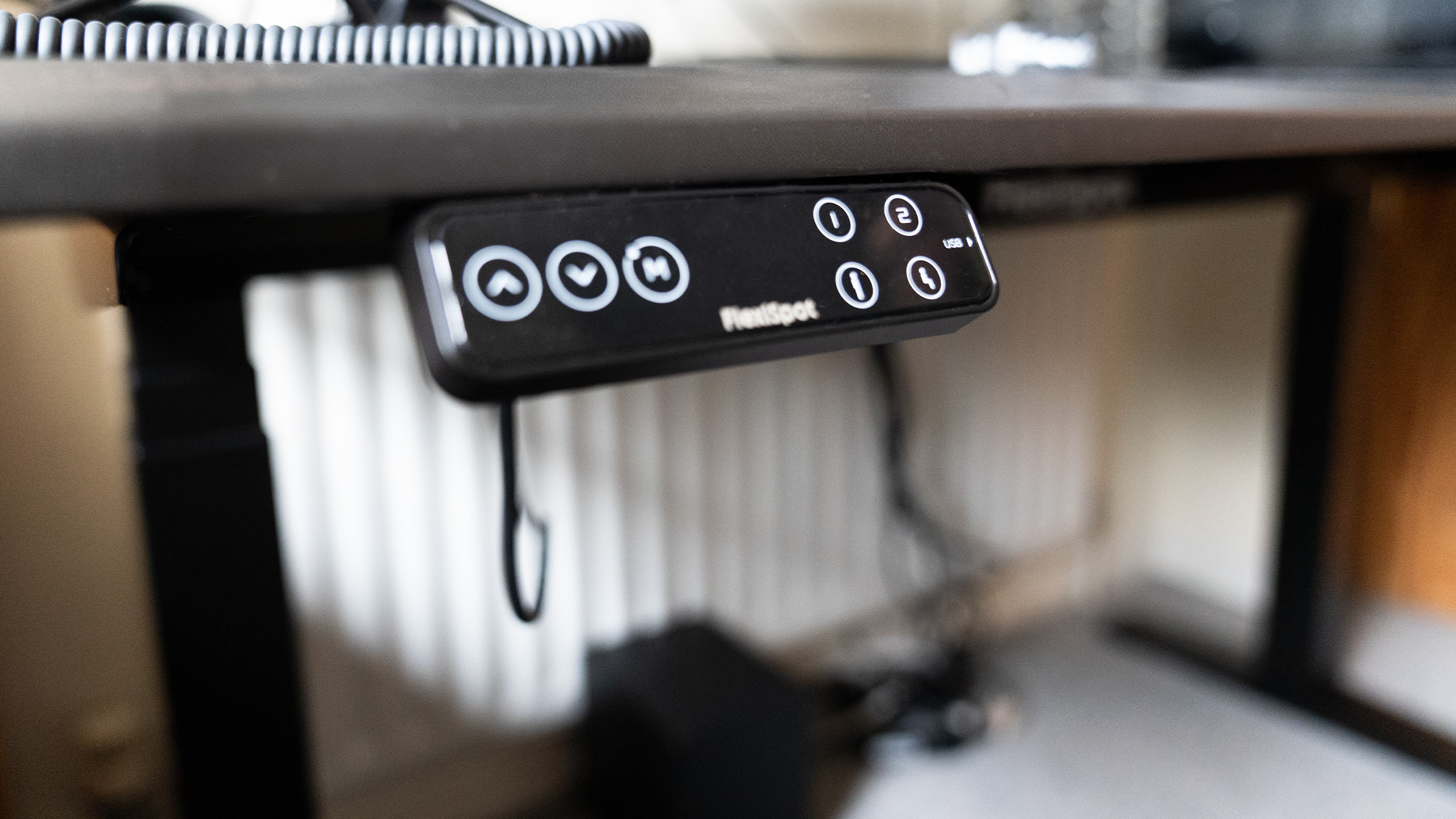
FlexiSpot G7: Performance
- Collision detection is welcome
- Noisy mechanism
- Wobbles when tall
The E7 Pro stand I got is made for a monster setup of a 440 lb (199.5 kg) max weight. That's far more weight capacity than your average gamer will ever need. The only real difference aesthetically from the cheaper ones is that the legs are pushed back with tapered brackets and feet. Other than that, you can only choose the Premier keypad to go with it.
That said, the Premier keypad is nicely rounded and has both adjustable collision prevention and four memory functions for height. It took mere seconds to get everything programmed, and you can even adjust the sensitivity of the collision detection, in case you have more easily breakable stuff to worry about, such as children. The Premier keypad, like the Premium before it, also has a USB-A port on the side, which is pretty darn handy.
It's worth noting that it can be a little unstable on the carpet when tall, even after settling into it for a good couple of weeks. Granted it's a pretty thick carpet, but there's a noticeable wobble when extended to a standing position, making team meetings a bit shaky. The motor, while smooth, is also a little noisy. Not the kind of thing you could operate silently while a loved one was asleep nearby.
Should you buy the FlexiSpot G7?
Buy it if...
Your setup is super heavy
This model specifically I can only recommend for people with really heavy equipment (up to 440 lbs / 199.5 kg). For your average gamer, there's otherwise not enough difference in the stands and keypads to warrant the extra cost unless you're packing some monster hardware.
You don't like mouse pads and wrist rests
The surface of the G7 desk means you don't need a mousepad and the chamfered edge is much nicer than your average desk with a sharp edge.
Don't buy it if...
You need lots of cable management
Sadly the smaller desktop of the G7 is incompatible with the FlexiSpot cable tray, so you'll either have to drill your own holes or make do with the magnetic one which isn't exactly robust.
You're on a budget
There are plenty of cheaper gaming desks out there with just as many features. This is not a cheap desk when paired with the E7 Pro stand.
Also consider
There's much to like about the FlexiSpot G7, though there are a couple of major alternatives I would recommend. Especially for those on a budget, or anyone looking for a more robust cable management solution.
Also consider the FlexiSpot E7
The FlexiSpot E7 is a great alternative as it uses one of the cheaper-but-still-good stand alternatives, and can still be configured with the gaming desktop.
For more information, check out our full FlexiSpot E7 review.
Also consider the Secretlab Magnus Pro
The Secretlab Magnus Pro is a great alternative because of its versatility and integrated cable management solution. It's perfect for gamers if you can warrant spending a little extra cash.
For more information, check out our full Secretlab Magnus Pro review.
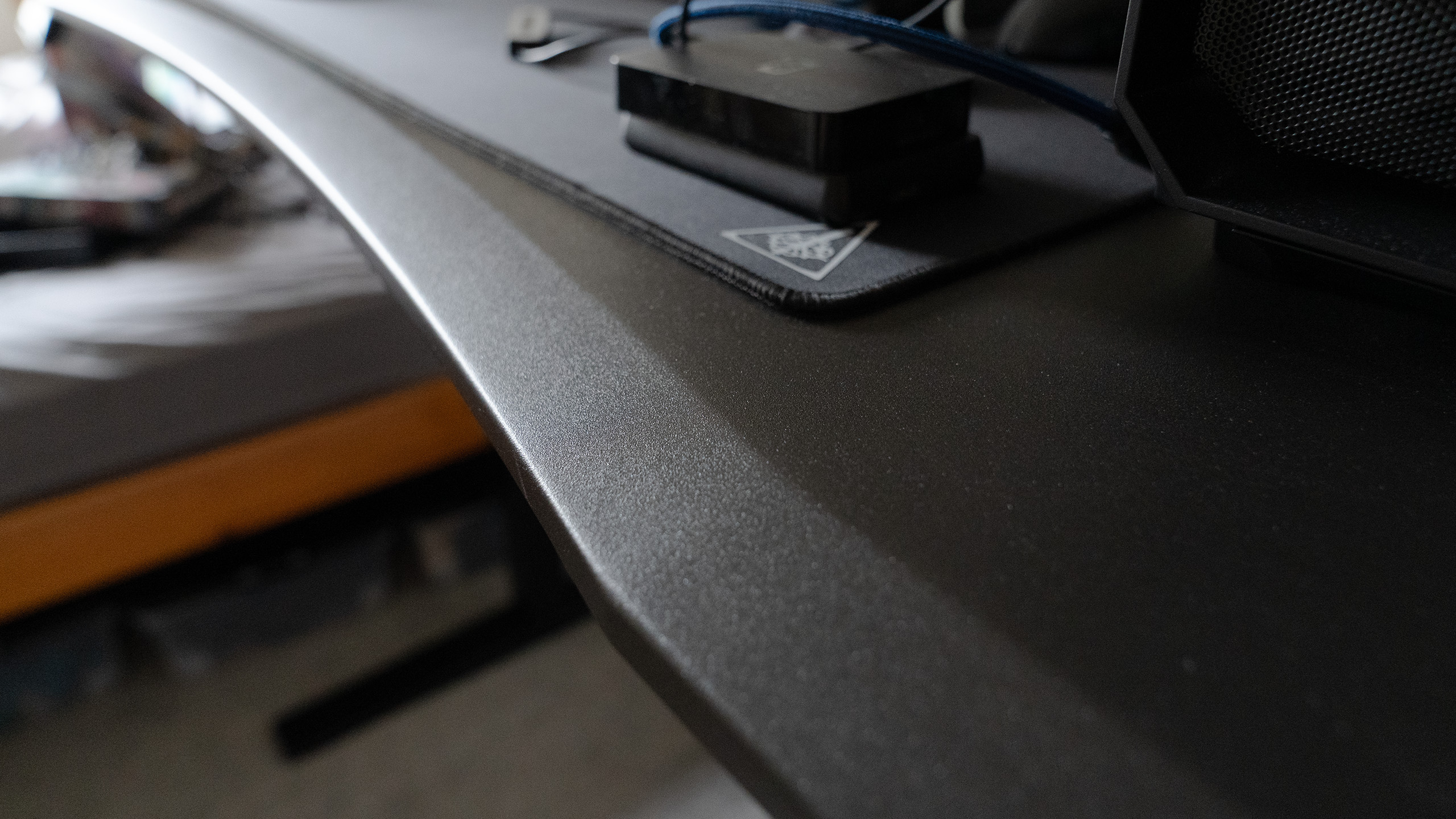
How I tested the FlexiSpot G7
- Put it together while timing myself
- Worked at the desk several hours a day for a few weeks
- Programmed the buttons, and checked the collision detection
I put the desk together myself, taking care to time the endeavor. I spent a few weeks working at the desk, first making time to familiarise myself with the controls. After programming it, and checking out the collision detection by whacking the bottom while it was in motion, I would spend some time each day working in different positions and listening to the motor intently as it moved.
First reviewed September 2024

 3 months ago
5
3 months ago
5


